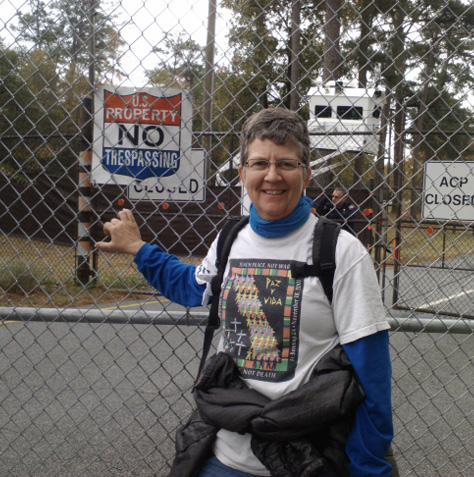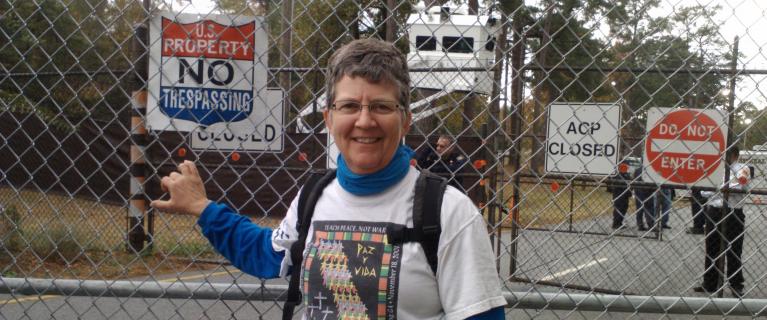Many of our readers, on learning that someone is a farmer, might automatically assume that person is conservative. Chris Gaunt turns this notion on its head. She is both an Iowa farmer and a dedicated activist for social justice. For this issue of Rootstalk, editor Tapiwa Zvidzwa interviewed her to trace the arc of her career as an activist.
Rootstalk: How did you initially became an activist?
Gaunt: I didn’t do much of anything until after 9/11/01. I watched and paid attention for the next year and it really tore me up to see my country make a choice to seek revenge through the military. That is, to bomb another country. I was already aware of the sanctions against the Iraqi people at that point, and I had been resisting that, like kind of from a distance. After 9/11, after witnessing this wave of fear that ran across the United States and literally took over government decisions, I braced my feet and said: “Not me.” I didn’t know what that would mean, but it ended up meaning I would be joining the resistance movement. I first joined in with some people in the Catholic Worker [community] in Des Moines. Then I started getting [involved in] more things nationwide, and that ended up taking me to Washington D.C., where I met friends from all over the country.
Rootstalk: I’d like to focus a bit more on the most recent protest you attended, at the Dakota Access pipeline. What prompted you to join this particular fight, and how did it fit in with the other protests that you’ve gone to?
Gaunt: Well it’s really interesting because from 2002—a year after 9/11—to 2012, I was involved in just about every protest movement, every nonviolent effort to change government policy concerning torture, that I could get myself in. Sometimes I couldn’t get myself into any protests, because the price I had paid [for previous activism]was going to jail for a number of months at a time, but I just kept [up with that involvement]. I was dedicated to it when I braced my feet, like I told you about a while ago: it [meant I]was dedicating my life to nonviolence, whatever that meant. I think I’ve learned that participating nonviolently [means] putting love into action. That’s where my stand was and is. I had decided I would risk arrest, which I did many times, and I would have to accept the consequences that might have come from [that choice]. That’s part of how I was seeing a nonviolent movement.
When 2012 got here, there was a switch in me. I can’t really explain it, but I backed off from really participating in the arrest scenarios. I just kind of quit without a lot of understanding, and I’m still trying to understand that. But the mood for me as I’m seeing it now has become more spiritual. Now, I’m tied into several movements across the country that are based in nonviolence, but yet I backed off. So from 2012 until last fall November, I really didn’t [become as involved in] arrestable scenarios—maybe two, during that time. I really had gone to a different place spiritually. I don’t know if that’s a good way to explain it.
But then the Standing Rock effort came up. Protecting the oil or water and this pipeline it’s just—I mean it’s just this grossest thing—so part of my spiritual development meant me reconnecting with Mother Earth. I did Vision Quest in California in 2010 and in 2012, and that was part of how I got reinforced for continuing this work. I just got reconnected with Mother Earth, and that took some time. So when this protest came up after [I had taken this ]little sabbatical, it was definitely the one for me because it was the Native Americans as I was seeing it; their water is life, and that’s something to stand for, for everybody. It’s not really an against thing. I recognized that my efforts before I stopped in 2012 [had been]based in my personal sense of anger at my government policies. Now that I had gone through this spiritual thing, the Standing Rock [protest] was perfect for me, because it was a prayerful movement. That’s how it seemed to me, and then I got the chance to go to Standing Rock and experience it, like really experience it in my body.
So now it doesn’t come from a place of anger [for me] anymore. The actions I take in the future are going to come from a place of love. That’s a huge hurdle. And I guess to say that I processed that through in four or five years is probably ok and it doesn’t matter how long it takes. So that’s what attracted me to Standing Rock: a prayerful approach to this serious issue.
Rootstalk: Can you describe what the atmosphere was like when you were at some of these protests?
Gaunt: Well, for me it’s you know it ends up being [about connecting] with a lot of like-minded people. If people have gotten together on an issue, and are willing to take that extra step of crossing a line, of being willing to risk arrest, that for me is very life-giving. [Because of] the spiritual changes in me, it’s now coming from a different place. So I think that’s a really good thing.
Rootstalk: What is the atmosphere like when you’re at these protests?
Gaunt: That’s something that has changed [for me] too, because part of the negative, the part that was drawing my energy down previous to my rejoining efforts to Standing Rock, was the court procedures. We were getting arrested, and in a lot of [these protests I was] by myself, and a lot of them were in Washington D.C. But I ended up learning. I got so many trespassing charges. They were always nonviolent offenses; criminal misdemeanors. But I got so many charges and I kept getting in front of judges and I thought, OK; this is like speaking truth to power. But the judges kept sentencing me and these friends of mine who were passionate, good people—sentencing us to really irrational prison sentences. I was served a three-month sentence and a six-month sentence. I witnessed my friends go to trial and get sentenced for six months for nonviolently resisting armed drone attacks. We knew in Afghanistan, at the Pakistan border, they were killing, our drones were attacking like young boys like they were [stacking] firewood. And we knew the bombs were dropped on wedding parties and then maybe even a second bomb would be dropped when rescuers came to get in. I’ve been to Afghanistan; we were hearing these stories from the ground.

Chris Gaunt outside the fence–which she would shortly cross–at the School of the Americas, Fort Benning Army Base, Columbus, Georgia, in 2011. It was her 14th consecutive year attending the Annual protest.
Rootstalk: And the atmosphere…
Gaunt: I’m still kind of putting this together in my own head. I had always thought that nonviolent effort and going to the court [and] civil disobedience would change things. That was the way it was in the past; the laws changed because people have resisted. But I think I hit a point where I saw, where I felt literally with my body, the futility [of trying to do things this way]. My eyes were opened to [the implications of the Supreme Court’s] Citizens United [decision]. Our elected officials were being bought and paid for. The Occupy Movement, which I was a part of, showed me this, and then [I had this sense of] futility sinking in. So actually, right now, I can say I no longer believe that those kinds of efforts can get the change we need, the legislative change. I’m really sad to say that. So then you are in limbo land and trying to figure out something else out, and then Standing Rock comes up and Occupy before that; Occupy, Black Lives Matter. [These movements] give me great hope, because they’re going a little bit of a different path, and I think more and more grassroots organizations are joining. So it’s going to come from the people, and that gives me hope
Rootstalk: That leads in to our next question. Has the recent Executive Order to continue construction of the pipeline maybe dampened your spirits in some way?
Gaunt: [chuckles] Yes sir, uhmm, yeah [long pause]. So being involved in the movement to shut down the pipeline, we know we are connected to social media, cetera, email. The resistors are still connected. So we’re not just going to throw up our hands and say, Well you know we’re going to do nothing. I mean, you know, this is connected to survival of the planet. So that’s not an option. So yeah; I do have hope, because of the people connection. Will it get worse before it gets better? Can it get any worse? I don’t think so. That last executive order to go ahead and continue that pipeline, yeah it dampened things. But on Monday (April 24) through Saturday (April 29) there’s a march from Cedar Rapids Iowa all the way to Des Moines, for a big rally that’s to stop the pipeline, and a whole different set of groups are going to participate. We’ll be walking like six, eight miles a day, and [the route runs right by Grinnell], so I’ve already got it all planned. We are already signed up to participate in that march. So I’m going to walk all day on the road together with people, and I’m going to camp with them at night. Different groups are going to meet. We are going to meet with small communities [along the way]. So I’m going to walk with those people and that gives me great hope, because we’re going to bring ourselves together we’re going to listen to people in rural Iowa and take the message to Des Moines, the capital, that this is important to so many people. There’s no giving up hope. With the kind of people that I know who are in this movement and all, what is happening is that people are joining forces with the different movements around these really important issues. So even as the Executive Order says this is going to go through anyway, the resistance is staying, its going to be there.
Rootstalk: What advice would you have for other people who want to voice their opinions, but who may be scared to go out and do so?
Gaunt: You know what I saw here [in Grinnell] on March 1st? The student day of resistance. I saw the most beautiful thing I’ve seen in a long time because Grinnell College students worked their tails off. They worked right here with the local population, and they created a day of protest and education and art music. So they created a day and a way to make people putting their voices out there safe; they did that. I witnessed it. They had organizers, and whoever organized it, they did a great job and it was a lot of work I’m sure. They wanted to march downtown to get themselves in the streets, so they called the Grinnell police and got a police escort. They made sure that everyone was safe going through the streets. They created their own artwork for the rally; there was singing, there was music, and there was a rally where students spoke and other people spoke. [One of the Native Americans involved in the Standing Rock protest] spoke about [that] issue, and so it was a nice conglomeration but they made it safe and I think effective. So I would say: Involve people who you know might not [know, and encourage them to]just say what they have to say or, you know, publicly speak it That’s a great way to start. We’re going to need everybody [if we want to make change]. If change is going to come, it’s going to come from the bottom up.


